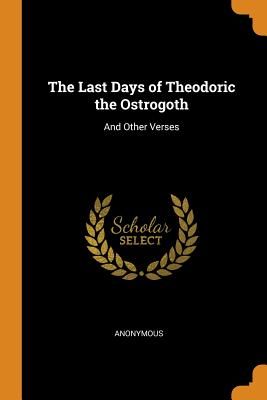Home
A Minor Poet and Other Verse
Loading Inventory...
Barnes and Noble
A Minor Poet and Other Verse
Current price: $5.99


Barnes and Noble
A Minor Poet and Other Verse
Current price: $5.99
Loading Inventory...
Size: OS
*Product Information may vary - to confirm product availability, pricing, and additional information please contact Barnes and Noble
A Minor Poet and Other Verse
(1884) is a poetry collection by Amy Levy. Published when the poet was only twenty-three years old,
is the work of a pioneering writer and feminist whose poetry and prose explores the concept of the New Woman while illuminating the realities of Jewish life in nineteenth century London. "I am sad / Here in this gracious city, whose white walls / Gleam snow-like in the sunlight; whose fair shrines / Are filled with wondrous images of gods; / Upon whose harbour's bosom ride tall ships, / Black-masted, fraught with fragrant merchandise; / Whose straight-limbed people, in fair stuffs arrayed, / Do throng from morn till eve the sunny streets." Brought to a foreign land by her lover Jason, Medea becomes an exile in body and soul. Unable to assimilate within a culture dedicated to commerce and flowing with hatred and vanity, she despairs and longs for release. In this monologue, Levy perhaps projects some of her own feelings as a feminist and lesbian living in Victorian England. Othered already through her Jewish identity, Levy struggled throughout her life with depression. In "Xantippe," a poem inspired by Socrates' wife, Levy imagines a monologue from a woman emerging from despair into hope, who sees "a rosy glimmer" at the casement and cries "O fling it wide [...] and give me light!" With a beautifully designed cover and professionally typeset manuscript, this edition Amy Levy's
is a classic work of British literature reimagined for modern readers.
(1884) is a poetry collection by Amy Levy. Published when the poet was only twenty-three years old,
is the work of a pioneering writer and feminist whose poetry and prose explores the concept of the New Woman while illuminating the realities of Jewish life in nineteenth century London. "I am sad / Here in this gracious city, whose white walls / Gleam snow-like in the sunlight; whose fair shrines / Are filled with wondrous images of gods; / Upon whose harbour's bosom ride tall ships, / Black-masted, fraught with fragrant merchandise; / Whose straight-limbed people, in fair stuffs arrayed, / Do throng from morn till eve the sunny streets." Brought to a foreign land by her lover Jason, Medea becomes an exile in body and soul. Unable to assimilate within a culture dedicated to commerce and flowing with hatred and vanity, she despairs and longs for release. In this monologue, Levy perhaps projects some of her own feelings as a feminist and lesbian living in Victorian England. Othered already through her Jewish identity, Levy struggled throughout her life with depression. In "Xantippe," a poem inspired by Socrates' wife, Levy imagines a monologue from a woman emerging from despair into hope, who sees "a rosy glimmer" at the casement and cries "O fling it wide [...] and give me light!" With a beautifully designed cover and professionally typeset manuscript, this edition Amy Levy's
is a classic work of British literature reimagined for modern readers.


















